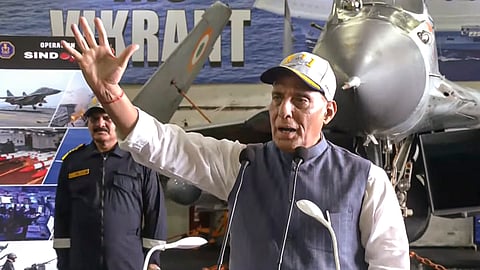

NEW DELHI: Defence Minister Rajnath Singh, while addressing officers and sailors aboard India’s first indigenous aircraft carrier INS Vikrant off the Goa coast on Friday, firmly reiterated India’s stance on Pakistan’s repeated offers of dialogue. “If there are talks, it will only be on terrorism and Pakistan-Occupied Kashmir (PoK). If Pakistan is serious about dialogue, it should hand over terrorists like Hafiz Saeed and Masood Azhar to India so that justice is served,” he said.
Singh pointed out that both individuals are not only on India’s list of ‘Most Wanted Terrorists’ but are also UN-designated terrorists. He highlighted the recent extradition of Tahawwur Rana, an accused in the 2008 Mumbai attacks, to India, adding that Hafiz Saeed too must face justice for his involvement in the attacks.
The Defence Minister reasserted that Operation Sindoor launched in response to the recent terror attack in Pahalgam is far from over. “This is only a pause, a warning,” he said. “If Pakistan repeats the same mistake, India’s response will be even more severe.”
Operation Sindoor, carried out by the Indian Armed Forces, was aimed at dismantling terrorist infrastructures in Pakistan and PoK. Singh emphasised that the operation is not just a military manoeuvre but a clear declaration of India’s zero-tolerance policy towards terrorism. “If Pakistan indulges in anything evil or unethical, it will this time face the full firepower of the Indian Navy,” he warned.
He lauded the Indian Navy’s strategic deployment and described it as the “silent service” during the operation. “The mighty Carrier Battle Group ensured the Pakistani Navy did not dare venture out, or else it would have faced dire consequences. If Pakistan casts an evil eye, it will be the Indian Navy that delivers the first blow in retaliation,” Singh declared.
Sending a stern message, the Defence Minister said Pakistan must understand that the era of using terrorism as a proxy war is over. “If Pakistan dares to provoke us with any terrorist activity, it will face defeat. India will not hesitate. Every means at our disposal will be used to root out this menace,” he added.
He criticised Pakistan for allowing anti-India activities to flourish openly on its soil and affirmed that India reserves the right to carry out any kind of operation across land or sea to protect its people. “Today, the global community acknowledges India’s right to safeguard its citizens against terrorism,” he noted, calling on Pakistan to dismantle the “nursery of terrorism” that continues to operate within its borders.
Praising the Indian Navy’s contribution to the joint operation, Singh pointed out that as the Indian Air Force struck terror bases inside Pakistan, the Navy’s aggressive presence in the Arabian Sea ensured Pakistani naval units remained confined to their shores. “Within 96 hours of the Pahalgam attack, our Western Fleet ships were at sea. They successfully carried out surface-to-surface and surface-to-air missile and torpedo firings along both the western and eastern coasts. This demonstrated the combat readiness of our systems, our platforms, and our people,” he said.
He added that the powerful projection of the Carrier Battle Group made India’s intent and capabilities abundantly clear. “The Navy’s military expertise and destructive capabilities broke the enemy’s morale. It was a strong and effective message,” Singh remarked.
The Defence Minister urged the Indian Navy to continue strengthening its operational readiness and reaffirmed Prime Minister Narendra Modi’s declaration that any terrorist act on Indian soil will henceforth be considered an act of war, and responded to accordingly.
“Within a very short span of time, we dismantled Pakistan’s terror infrastructure and shattered its intentions. Our response was so forceful that Pakistan pleaded for de-escalation. Let it be known we paused on our own terms. Our forces had not even begun to show their full might,” he said.
Concluding his address, Rajnath Singh remarked: “We now live in a world where wars are not fought only with bullets and bombs, but also through cyberspace, data dominance, and strategic deterrence. It is a matter of pride that the Indian Navy is advancing strongly in these domains.”
Describing the Navy as more than just the “sentinel of the Indian Ocean”, Singh said it is a strategic force strengthening India’s regional and global influence. “The message to our adversaries is clear India is no longer merely a regional power. It is stepping into the role of a global power,” he said.
The Defence Minister arrived in Goa on 29 May 2025 and interacted with Indian Navy personnel involved in the initial phase of Operation Sindoor. In addition to INS Vikrant, he boarded several frontline warships that played a critical role in compelling Pakistani naval units to remain close to the Makran Coast.